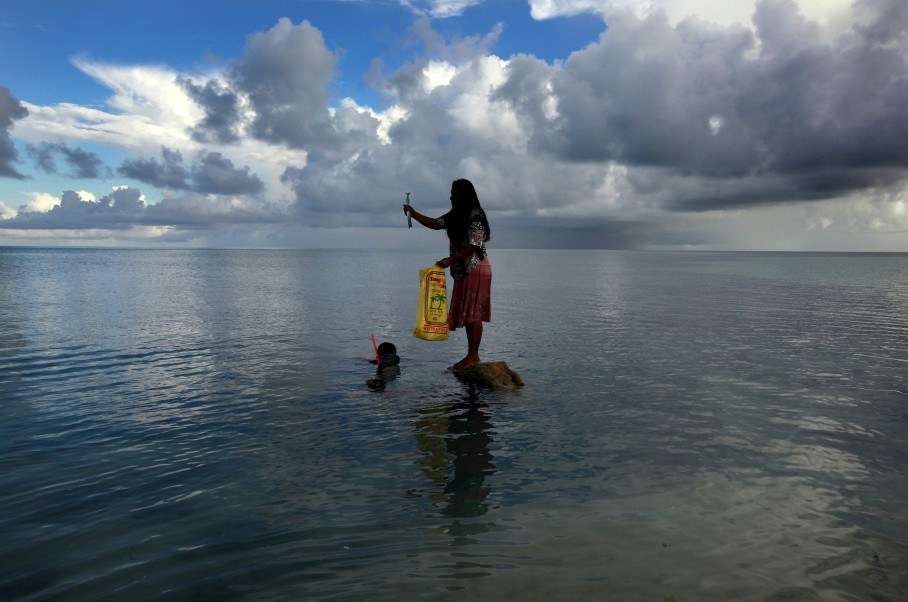The Volokh Conspiracy
Mostly law professors | Sometimes contrarian | Often libertarian | Always independent
Potayto, potahto, Germany, Deutschland -- what we call other countries

Some weeks ago, a colleague mentioned that most people mispronounce Kiribati. The right pronunciation, he said, was "Kiribas," because that's how it's pronounced in Kiribatese. The Cambridge Dictionaries (even limited to the American pronunciation) and Merriam-Webster agree with him; dictionary.com (based on the Random House dictionary) and the American Heritage Dictionary give both "Kiribati" and "Kiribas."
My view is that of dictionary.com and the American Heritage: both are likely standard in American English. If you are talking to Kiribati specialists, you might win points by ending the word with an "-s." If you are talking to ordinary English speakers, you will more likely be understood if you end the word with a "-ti."
But beyond that, my broader view is that English pronunciation of place names is a question related to the English language, not to the foreign language - that Kiribatese say "Kiribas" means very little to what is linguistically correct in English.
Indeed, this is the way we handle a vast range of familiar foreign place names. We say "Russia," not "Rossyia"; "Yookraine," not "Ookraina"; "Spain," not "Espanya"; "Sweden," not "Sveriye." Indeed, it is the rare European country that we pronounce the same way the locals do. Even "France," for instance, is pronounced with an "a" as in "mad" and not with the French "ah" as in "ma." And I'm not just speaking here about adapting foreign phonemes to the English sound structure; many English speakers would indeed have a hard time with the trilled Russian "R," but they could pronounce the other sounds in "Rossiya" just fine. We just don't.
Just as we have our own English words for "cat" and "house," so we have our own English words for "Russia," "Spain," "Sweden," and "Kiribati." And this isn't some peculiar English thing. It's certainly true in Russian ("Angliya" for "England," "Frantsiya" for "France," "Shvetsiya" for "Sveriye," "Germaniya" for what the natives pronounce as "Doychland"). My understanding is that this is true for many other languages, including French ("Angleterre" for "England," "Allemagne" for that Doychland place, and so on), Spanish and others. I can't speak to how the Kiribatese speak, but I would suspect that they too have their own names for other countries in their language. It is, after all, their language.
Now my sense is that the variations between the English name for a country and the country's own name for itself are actually greater for European countries than for other countries. European countries tend to be older, and tend to have been known to English speakers for longer. The English word for the country may be based on what the country was called when the English first started talking about it, or what it was called in some other language through which the country's name was borrowed. And there has been time for the word to evolve. When a new country's English name is chosen, that choice is usually substantially influenced by that new country's local name.
But the influence is imperfect, partly because the transliteration schemes for that country's domestic language may be different than for English (as with Kiribati). As a result, the general pattern, as best I can tell, is that English speakers tend to write new countries' names as written by the government of the country, but pronounce them the way the name is normally pronounced in English - hence, "Kiribati" with the standard English "-ti." That's the way it's likely to stay, at least unless the country becomes especially important, and it becomes especially useful for English speakers to pronounce things the local way. And there's nothing linguistically wrong with its staying that way, because languages have their own worlds for foreign place names just as they have their own words for anything else.
And, no, I don't feel compelled to say "Myanmar" instead of "Burma," just as I don't feel compelled to say "Ellatha" (or "Ellada") for "Greece," "Shqiperia" for "Albania," or "Deutschland" for "Germany." If enough English speakers start using those names, I'll probably go along for the sake of clarity and avoidance of distraction. But until that happens, the traditional English names are good enough for me.


Show Comments (0)